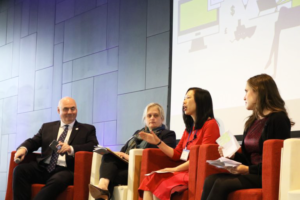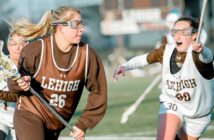
Kevin Cassidy, director and representative to the Bretton Woods and Multilateral Organizations, ILO Office for the United States, moderates a panel on equality in the workforce with Jennifer Rosenbaum, U.S. director, Global Labor Justice; Serena Fong, vice president, Strategic Engagement, Catalyst; and Lis Meyers, managing associate, Gender and Social Inclusion, Nathan. The discussion discussed the gender-gap of pay and how to combat it. (Sally Gu/B&W Staff)
Cyber-city analyst. Organ or body part creator. Asteroid-mining engineer. Robot Councilor.
None of these occupations exist in 2019, but Kevin Cassidy, Director of the International Labour Organization for the U.S., cited them as potential jobs of the future for current college students.
Cassidy gave his take on a “Human-Centered Agenda for the Future of Work” on the morning of April 11, with over 100 of the 280 people in the room being students who might go on to step into the positions he envisioned.
His commentary was part of a day-long discussion of what the future holds for education systems, equality in the workforce and global value chains, held at Mountaintop Campus to celebrate the ILO’s 100th anniversary. Experts from private corporations, NGOs and educational institutions traded complex insights through panels and speeches.
Bill Hunter, the director of U.N. Programs and Fellowship Advising, said a number of panelists remarked about the challenging questions asked by students from Parkland High School in Allentown.
Parkland sent a bus of Model U.N. participants who had just won a local competition for the Lehigh Valley, which took place on Lehigh’s campus over spring break.
After Cassidy claimed that when people have a purpose, they tend to be more peaceful, a student from Parkland flipped his point on him during the Q&A session. The student asked how the generation of tomorrow will find purpose with changing opinions on religion and such a volatile workforce trajectory.
“When we work as interns, or starting at companies, we’re often discarded or demeaned,” said Punya Bhasin, an 11th-grader at Parkland. “They think, ‘Oh, you’re young, you’re not going to have (good) ideas.’ But the fact that they were interested in learning (from us) gives me a lot of hope for the future.”
Bhasin and her peers had the opportunity to have their voices heard at the conference, which she said shouldn’t be out of the ordinary.
No matter the opinions people hold, Bhasin said the reality is that her generation is the future of work.
College students made up a large portion of the audience, including Lehigh students as well as delegations sent from a dozen other Northeastern universities such as Ithaca College, New York University, Drexel and Temple, Hunter said.
Hunter said though many presenters have spent years or decades trying to create an equitable and sustainable workforce, student reactions and participation were the indicator of the success of the event.
In addition to student attendees, five Lehigh students gave short speeches about how they anticipate the future of work to impact them.
Gili Remen, ‘19, spoke about her future aspirations to improve journalistic dialogue as an international correspondent in the Middle East.
Khan said the event was made more engaging and powerful with the student speaker portion because it gave the students an opportunity to present their vision for the future of work after several older and middle aged adults provided remarks. She said while previous older speakers proposed various policy changes, the students would be the ones impacted by these ideas in the first place.
“To see the ILO come to Lehigh and be chosen as the North American site for their conference is a big and exciting step,” Khan said. “Lehigh students can do anything… and this conference proved that.”





Comment policy
Comments posted to The Brown and White website are reviewed by a moderator before being approved. Incendiary speech or harassing language, including comments targeted at individuals, may be deemed unacceptable and not published. Spam and other soliciting will also be declined.
The Brown and White also reserves the right to not publish entirely anonymous comments.